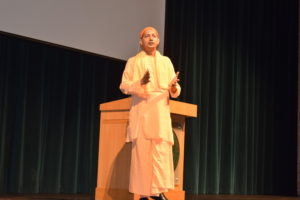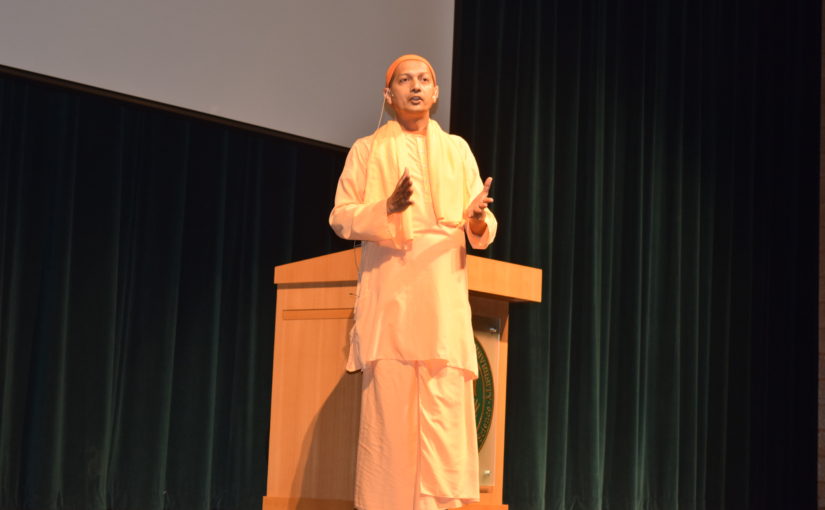Swami Sarvapriyananda, a Hindu monk of the Ramakrishna Order, gave a talk on Sunday on the topic of finding peace post-9/11 by taking ideas from Vedantic philosophy, which is the core philosophy of Hinduism.
One idea central to Vedantic thought is that “truth is one, but the wise speak of it in many ways.” Essentially, Vedantic philosophy holds that all religions teach the same basic truths, and much of the disharmony stemming from religion is due only to superficial differences.

Sarvapriyananda made the distinction between the pluralistic idea of tolerance, which carries a negative connotation with it, and the Vedantic emphasis on acceptance.
“In pluralism there is this idea that you need to leave the other guy alone, but that’s a little artificial,”Sarvapriyananda said. “Just look at the society we live in — we live together, we read each others books, we listen to speakers with different views. We should move past tolerance to actual acceptance. There should be ample space to assimilate, to learn from each other.”
According to Sarvapriyananda, the basis for not accepting the religion of others tends to be dogmatic in nature.
“The root of not accepting other peoples’ religion is the idea that ‘I am right and everyone else is wrong,’ but I feel that each of the great religious traditions of humanity has the theological basis for a more liberal, accepting interpretation,” he said.
Sarvapriyananda’s goal is to spread ideas from Vedantic philosophy throughout the world.
“It is not my goal for people to accept these ideas under the name of ‘Vedanta.’ I think these ideas are compelling and useful in themselves, and should be shared,” Sarvapriyananda noted.
From a Vedantic perspective, the goal of religion and of human life in general is to find happiness and avoid suffering.
“The common goal of humanity, and of religion as we understand it, is the same — not two different goals. If you are pursuing spiritual understanding, we call you spiritual, and if you aren’t seeking, we call it life. Either way, the goal is the same.”
Vedanta accents the innate divinity of humanity as the common bond that connects everyone in the world.
“The central teaching of non-dual Vedanta is ‘tat dvam asi’ in Sanskrit — literally translated, ‘that thou art’ — you are Brahman, you are the ultimate reality, if you would only know yourself as you really are.”
In Vedanta, the central problem is not “sin,” it is simply ignorance and not knowing what we really are.
“We should promote the idea of the divinity in all of us. Regardless of caste, race, gender, sexual preference, that is where we are all one and equal. That is of paramount importance; everything else is incidental, it comes and goes. It can serve as the basis for respect and even reverence for each other,” he said.
“And also, let’s be bold enough to think for ourselves, to bring the light of our age to bear on religion. Those of the past did the best we could, but we should take our religious heritage and move forward.”
“The light of science, of reason, of progress in gender equality and humanitarian advancements we have made, these are the contribution of our age,” Sarvapriyananda commented. “We don’t need to use religion to oppose these things or claim that they were already there in religion — let’s focus that light on our religious heritage, and if anything is against that, let’s be bold enough to get rid of it, let’s be bold enough to take the best we can from our religious heritage and move ahead.”
